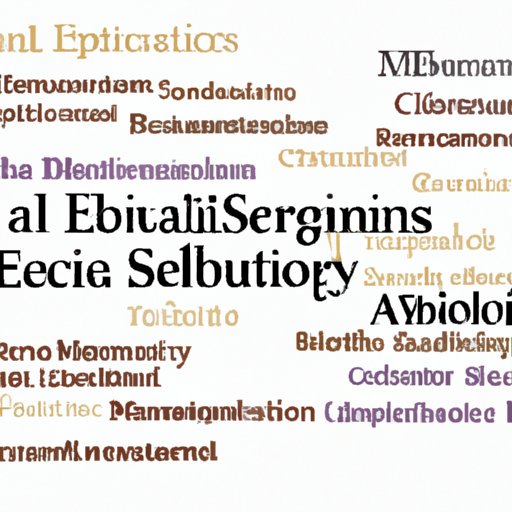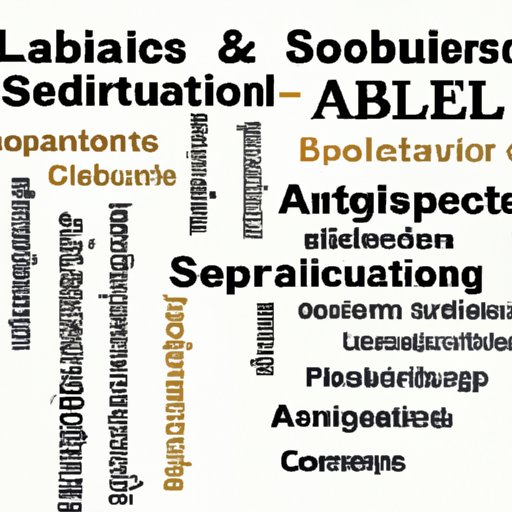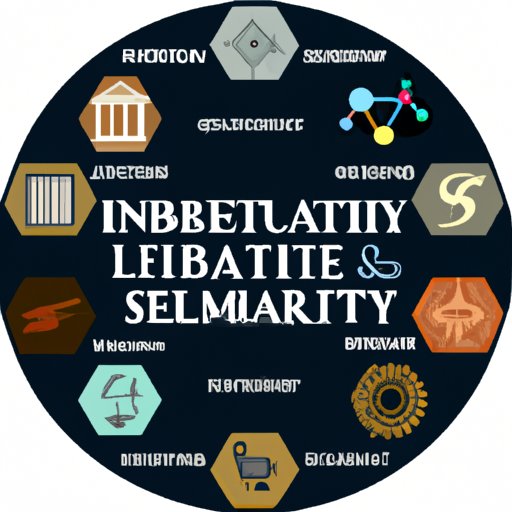Introduction
Liberal Arts and Sciences (LAS) is an interdisciplinary field that combines the study of the humanities, social sciences, and natural sciences. This type of education aims to provide students with a broad, well-rounded knowledge base that can be applied in various contexts. The purpose of this article is to explore the benefits of a Liberal Arts and Sciences education, particularly in terms of enhancing critical thinking skills and preparing students for graduate school and professional success.
A Comparison of Liberal Arts and Sciences: Exploring the Differences
In order to understand the differences between Liberal Arts and Sciences, it is important to first define each term. Liberal Arts typically refers to the humanities, such as art history, literature, philosophy, psychology, and political science. These fields focus on the study of human culture and behavior and emphasize the development of analytical and critical thinking skills. Sciences, on the other hand, typically refer to the natural sciences, such as mathematics, physics, chemistry, and biology. These fields focus on the study of the physical world and emphasize the application of scientific theories and methods to solve problems.
The main difference between Liberal Arts and Sciences is the emphasis placed on the development of different skills. While both fields require the development of critical thinking skills, Liberal Arts focuses more on the analysis of qualitative data and the drawing of connections between different disciplines, while Sciences emphasizes the application of quantitative data and scientific theories to practical problems. Additionally, Liberal Arts courses usually require more written work than Science courses and are often more discussion-based.

Exploring the Benefits of a Liberal Arts and Sciences Education
While each field has its own unique benefits, an education in Liberal Arts and Sciences provides students with a wide range of skills that are applicable in many different contexts. Specifically, a Liberal Arts and Sciences education can help students enhance their critical thinking skills, improve their communication abilities, and develop their problem-solving abilities.

Examining How Liberal Arts and Sciences Enhance Critical Thinking Skills
One of the key benefits of a Liberal Arts and Sciences education is the development of critical thinking skills. According to a study by the Association of American Colleges and Universities, “students who major in the liberal arts and sciences are better prepared to think critically, communicate clearly, and solve complex problems.” This is due to the fact that Liberal Arts and Sciences courses encourage students to apply theoretical concepts to practical situations and analyze both quantitative and qualitative data. Additionally, Liberal Arts and Sciences courses often require students to draw connections between different disciplines, which helps them develop a more holistic understanding of the world around them.
An Overview of the Different Fields in Liberal Arts and Sciences
Liberal Arts and Sciences consists of a variety of different fields, including Art History, Literature, Philosophy, Psychology, Political Science, Economics, Mathematics, and the Natural Sciences. Each of these fields provides students with a unique set of skills that can be applied in many different contexts. For example, Art History courses teach students to analyze visual representations and interpret cultural meaning, while Political Science courses help students understand the complexities of international relations and public policy.

The Role of Liberal Arts and Sciences in Professional Success
In addition to providing students with a wide range of skills, an education in Liberal Arts and Sciences can also help students prepare for graduate school and pursue career opportunities. By taking courses in both the humanities and sciences, students can develop a well-rounded knowledge base that is highly valuable in many different contexts. Additionally, by studying a variety of different fields, students can gain a better understanding of the world around them, which can help them make more informed decisions in their professional lives.
Additionally, an education in Liberal Arts and Sciences can help students develop marketable skills that can be applied to various job roles. According to a study by the National Association of Colleges and Employers, employers value graduates with a strong foundation in the liberal arts and sciences because they possess “the ability to think critically, communicate effectively, solve problems, and work collaboratively.” These skills are highly sought after in today’s competitive job market and can give graduates an edge over their peers.
Conclusion
An education in Liberal Arts and Sciences can provide students with a wide range of skills that are applicable in many different contexts. By studying both the humanities and sciences, students can gain a well-rounded knowledge base that can help them enhance their critical thinking skills, improve their communication abilities, and develop their problem-solving skills. Additionally, an education in Liberal Arts and Sciences can help students prepare for graduate school and pursue career opportunities, as employers value graduates with a strong foundation in these fields.
In conclusion, an education in Liberal Arts and Sciences can provide students with a wealth of knowledge and skills that can be applied in many different contexts. By studying both the humanities and sciences, students can gain a well-rounded understanding of the world around them and develop marketable skills that can help them achieve success in their professional lives.
(Note: Is this article not meeting your expectations? Do you have knowledge or insights to share? Unlock new opportunities and expand your reach by joining our authors team. Click Registration to join us and share your expertise with our readers.)
